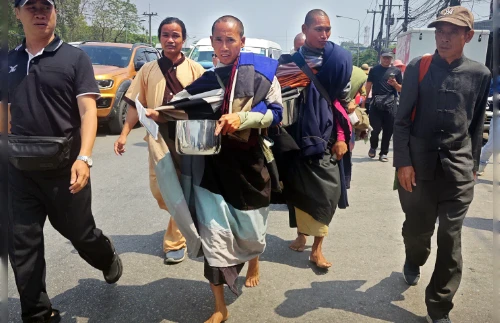Tashi Wangchuk has been monitored by Chinese authorities since his release last year from prison.
By Sangyal Kunchok

A Tibetan activist traveling to promote language rights in Tibetan areas of western China has been denied shelter, RFA has learned, after authorities ordered hotel operators in the region to turn him away.
Tashi Wangchuk, a former political prisoner aged around 35, had been traveling in China’s Qinghai province since April 6, a Tibetan living in the area told RFA’s Tibetan Service in an exclusive interview earlier this week.
“On his way from Yulshul to Siling, he had stopped by various Tibetan schools in Golog, Rebgong and Malho to advocate for the use of Tibetan language in Tibetan schools,” RFA’s source said, speaking on condition of anonymity for security reasons.
“But he was denied accommodation and dismissed from hotels in Rebgong [In Chinese, Tongren] and Malho [Huangnan]. We don’t have any information about his present whereabouts, and it’s dangerous to talk about this,” he added.
Wangchuk was later confirmed by RFA to be staying at his brother’s home in Siling, where officials are requiring anyone traveling to the area to enter a 15-day quarantine for COVID-19. Sources said authorities continue to monitor his movements.
A resident of Qinghai’s Yulshul (Yushu) municipality, Wangchuk was released on Jan. 28, 2021, after completing a prison term for “inciting separatism” and is now subject to near-constant monitoring by authorities.
While traveling, Wangchuk had posted photos and videos of his visits to Tibetan schools in Darlag (Dali) county in the Golog (Guoluo) Tibetan Autonomous Prefecture and in Rebgong, where Chinese authorities have clamped down on the use of the Tibetan language in teaching, RFA’s source said.
“However, only 30 minutes after checking into a hotel in Rebgong on April 7, the hotel told him to leave after they were instructed by county police not to let him stay, and his attempts to find a hotel on April 8 and 9 also failed after police told the hotels not to give him accommodation.”
When Wangchuk went to a police station in the Malho prefecture to complain, he was denied entry to the station and told no one there could talk to him, the source said. “And later he even went to Rebgong county’s Commission for Discipline Inspection to file an appeal, but it was closed.”
“After April 10, all the details that he posted on his Weibo social media account were deleted by the Chinese authorities, so it’s difficult to learn anything now about his well-being,” he added.
Also speaking to RFA, Pema Gyal — a researcher at London-based Tibet Watch — said that former political prisoners in Tibet are kept on Chinese government black lists and often have trouble finding jobs or accommodation in hotels.
“We are, of course, very concerned about Tashi Wangchuk at the moment,” Gyal said.
While China claims to uphold the rights of all minorities to access a bilingual education, Tibetan-language schools have been forced to shut down, and school-age children in Tibet regularly receive instruction only in Mandarin Chinese.
Similar policies have been deployed against ethnic Mongolians in China’s Inner Mongolia and Muslim Uyghurs in northwestern China’s region ofof Xinjiang.
Formerly an independent nation, Tibet was invaded and incorporated into China by force more than 70 years ago.
Language rights have become a particular focus for Tibetan efforts to assert national identity in recent years, with informally organized language courses in the monasteries and towns deemed “illegal associations” and teachers subject to detention and arrest, sources say.
Translated by Tenzin Dickyi for RFA’s Tibetan Service. Written in English by Richard Finney.
Copyright © 1998-2020, RFA. Used with the permission of Radio Free Asia, 2025 M St. NW, Suite 300, Washington DC 20036. https://www.rfa.org















